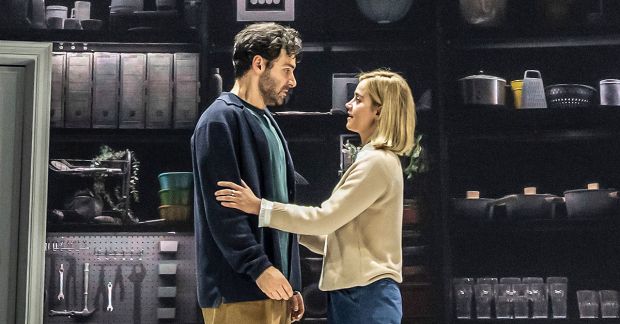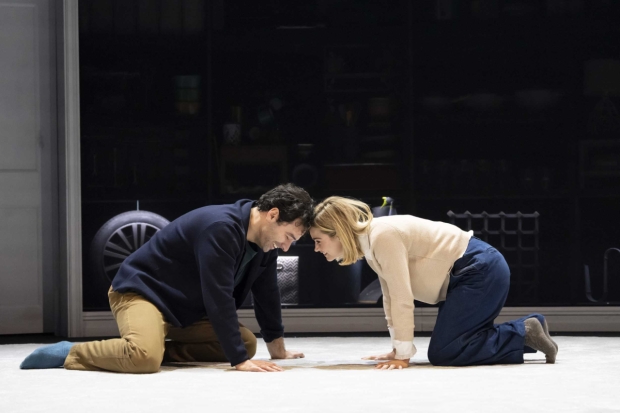”Lemons Lemons Lemons Lemons Lemons” in the West End review – Aidan Turner and Jenna Coleman at a loss for words

© Johan Persson
School children study it, apparently, mulling over the idea that a government might want to impose a Quietude Act – or Hush Law as it is known – and limit its citizens to minimal communication. It’s a thought-provoking idea, but as drama, on stage, it runs out of steam. The richness of this production, directed by Josie Rourke and starring the hugely popular Aidan Turner (of Poldark fame) and Jenna Coleman (from Doctor Who, The Sandman and Victoria) can’t quite disguise moments of imaginative rather than verbal poverty. Even at a brisk 85-minutes it all feels a bit thin.
It pivots not only on the imagined law but on the love affair between Oliver and Bernadette, whom we follow from their first meeting in a pet cemetery through the vicissitudes of their life both before the Hush Law and after. The scenes are arranged non-chronologically, so the picture of their relationship emerges gradually, shifting and changing all the time.
Even before their communications are limited by an Orwellian state there are tensions in their match of opposites. He’s a laid-back freelance musician – “though recently it’s just been jingles for adverts mainly” – whose family live in a castle; she is a lawyer who has worked her way up from working class beginnings. He believes the Hush Law must be opposed by protest because it will silence those with least power, while the rich find a way around it. She closes her eyes, hopes for the best, believes it will never be voted in.
Turner is brilliant at communicating the narcissism and vulnerability that lie beneath Oliver’s casual authority, the way he talks over Bernadette without even meaning to; Coleman waits, watchful like a bird, diminished even as she longs to have her say. When they lose the ability to talk at length, announcing the number of words they have left before they speak, their fights seem more bitter – over the way she squanders words at work, over his contempt for her job.

© Johan Persson
The dialogue is never less than smart and clever ideas lurk. With talk of repeal of a law that becomes unpopular, there’s the obvious echoes of Brexit; as people who have lived through the privations of lockdown, it’s hard not to find resonance in the theme of how we communicate and what we say when we have limited means to do so.
There are moments of luminescence – as when Bernadette sums up the pros and cons of having a baby in 40 words, or Oliver mourns the constrictions of vocabulary over a lifetime – but the stranglehold imposed on the writing, which means lots of short, sentences, and abbreviated thoughts, suppresses feeling and range.
For all Turner and Coleman’s energy, you never quite get to know this couple, so the play feels less profound and less moving than it should.


















